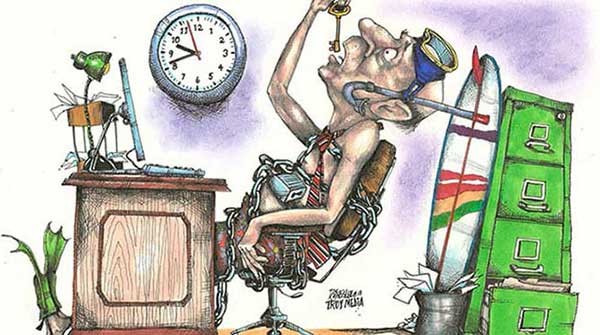Pay raises during the pandemic and no worries about losing their jobs not enough: They now want up to 47% more from taxpayers
 Canadians shouldn’t feel sorry for privileged federal bureaucrats.
Canadians shouldn’t feel sorry for privileged federal bureaucrats.
They don’t have to worry about losing their jobs or missing a paycheque. They get pay raises and bonuses, even if they don’t meet their own performance targets. Now they want billions more from taxpayers struggling to pay for groceries and make their mortgage payments.
Here’s the situation in Ottawa:
The feds gave 312,825 bureaucrats at least one pay raise in the past few years. That means more than 90 percent of the bureaucracy received a raise during the pandemic.
The feds paid out $559 million in bonuses since 2020.
 |
| Related Stories |
| Recession for who? Not government employees
|
| Bureaucracy may be necessary, but it is never harmless
|
| The public/private compensation gap is soaring in Canada
|
Those bonuses flowed as usual even though “less than 50 percent of targets are consistently met within the same year,” according to the Parliamentary Budget Officer.
The feds hired 31,227 more bureaucrats over the last two years. The bureaucracy ballooned by 78,923 extra employees since 2015.
Compensation for each full-time federal employee is $125,300 when pay, pension, paid time off, shift premiums and other benefits are considered, according to the PBO. There are now more than 100,000 federal employees taking home a six-figure yearly salary.
The reality outside of the golden government gates isn’t as sunny. According to data from Statistics Canada, the average hourly wage in Canada in 2022 was $31.96. Given a 40-hour work week and 52-week working year, that equals an average annual salary of $66,476.
The Fraser Institute also crunched the numbers. Government employees receive 8.5 percent higher wages than their counterparts working for a business. Bureaucrats also have better pensions, retire earlier, have better job security and take more days off.
Despite federal bureaucrats taking pay raises during the pandemic and never worrying about losing their job, their union negotiators are now demanding up to 47 percent compensation increases over three years, according to the Treasury Board of Canada Secretariat.
That would cost taxpayers $9.3 billion and “represent an ongoing annual cost increase of approximately $27,500 per employee,” according to the TBS.
This is about more than salaries.
The government union negotiators are trying to raid the public purse with their non-wage demands, which can be found in a document entitled: “Public Interest Commission Brief of the Public Service Alliance of Canada.”
Bureaucrats want more money if they work past 4 p.m.
They want an education fund for laid-off employees of up to $17,000.
They want to stuff more tax dollars into a union-controlled “social justice fund” to engage in “advocacy for progressive public policy.” They’ve used the fund to send members to climate conferences in Madrid and Cancun and to advocate for higher business taxes. Taxpayers shouldn’t be paying for their advocacy.
The demands don’t stop there.
They want “increased paid leave for family-related responsibilities from 37.5 hours to 75 hours every year” and “four weeks of automatic vacation leave after four years of service,” according to the TBS. They also want “overtime paid at double-time, where now it is most often paid at time-and-a-half.”
The government union negotiators defend their demands by noting that “the cost of living is rising.”
But what does more paid time off have to do with inflation? How does a month of vacation help bureaucrats afford the price of chicken? These demands aren’t really about inflation. They’re about taking as much money from taxpayers as possible.
Here’s what should happen:
The feds should reduce the total cost of the bureaucracy, which ballooned by 31 percent over the past two years. The feds can find savings through attrition, removing perks like the union-controlled social justice fund, reducing the number of bureaucrats in Ottawa, pay cuts or a combination of all of the above.
A serious federal government would take a page from former Alberta premier Ralph Klein and put the onus on the union: take pay and benefit cuts or hand out pink slips.
Franco Terrazzano is the Federal Director of the Canadian Taxpayers Federation.
For interview requests, click here.
The opinions expressed by our columnists and contributors are theirs alone and do not inherently or expressly reflect the views of our publication.
© Troy Media
Troy Media is an editorial content provider to media outlets and its own hosted community news outlets across Canada.


I don’t think I have ever read a column with so many inaccuracies and false info in my life. I am not a federal employee, but my brother is, and before you submit a column to be published, you need to do more research. Terrible job! There has been no raise since June 2020. No one is asking for 47%. Of the striking workers, no one qualifies for bonuses, that is management only. Nice job skewing the facts though.